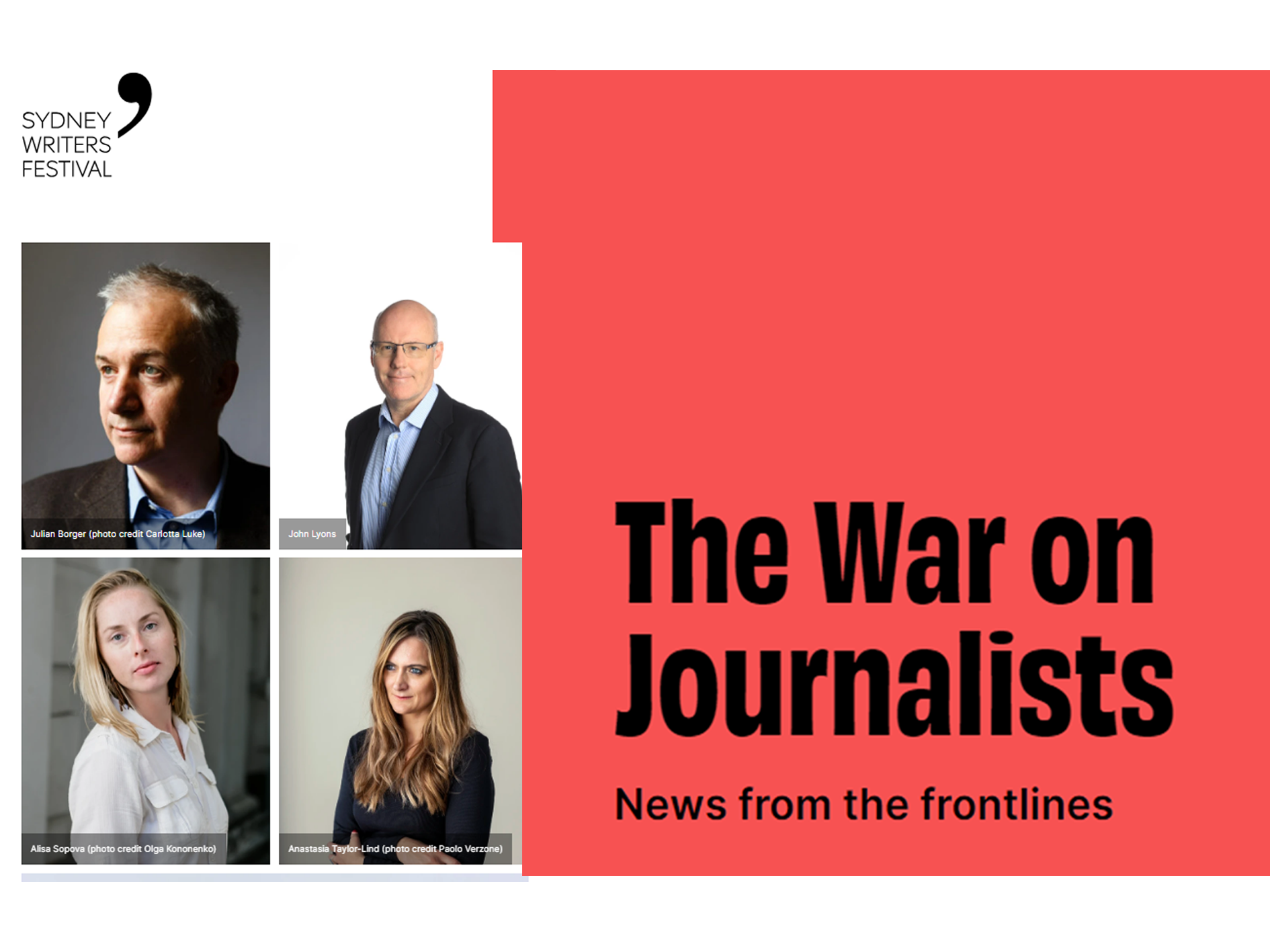Shireen Abu Akleh. Hamza Al-Dahdouh. Plestia Alaqad. Motaz Azaiza. Bisan Owda. All names of Palestinian journalists who have insisted on documenting the reality in Gaza.
In the last seven months, they have become widely recognised figures within what is referred to as ‘good’ journalism. But what defines ‘good’ journalism? Is it objectivity, or ‘truth-telling’? And do these go hand in hand?
To be more specific, is there a war on journalists? If so, what does this mean for the future of journalism? The Sydney Writers Festival hosted a panel to discuss these pressing questions, facilitated by Hamish Macdonald, and featured Alisa Sopova, John Lyons, Anastasia Taylor-Lind and Julian Borger.
Hamish Macdonald, host of The Project on Network Ten set the tone of the panel by opening the discussion with the monumental statistic that Israel has killed 105 journalists in Gaza since October 2023, making 2023 the deadliest year on record for journalists. Even so, the panel was quick to point out that the Committee to Protect Journalists, amongst other organisations, only counts deaths and injuries when journalists were on duty at the time. Thus, stipulating that there are countless journalist deaths unaccounted for, instead lost in the flood of civilian deaths.
Ukrainian journalist Alisa Sopova underscored the sheer lack of English-speaking journalists who report on foreign wars and conflicts, emphasising the pressure that falls on local journalists to bridge this gap. Sopova noted that a vast majority of journalists flock towards “sports, fashion and pop culture reporting”, something a war-torn Ukraine cannot know. By drawing attention to this dichotomy between what is classified as ‘news’ as opposed to ‘journalism’, Sopova identified a significant ode to the way in which postcolonialism manifests in the so-called West. Notably, she implored the audience to reflect on the privilege we possess in our ability to move on from critical, hard-hitting news to fun and light-hearted stories.
John Lyons, renowned Australian journalist and author of Balcony Over Jerusalem (2017), further contextualised the war on journalists as a war on truth. Lyons adeptly exposed that journalists are frequently under fire for truthful reportage on the genocide in Gaza, exclaiming “If you tell what you see, you get barraged for it”.
While interrogating the questionable nature of objectivity in journalism, Lyons spoke to the time when he published an exposé detailing Israeli war crimes — such as the use of white phosphorus — and was subsequently attacked by Zionist lobby groups for being anti-Semitic. This begs the question, does public pressure make journalism harder or better? According to Lyons, it is neither. He proceeded to denounce the common, Westernised rhetoric where self-censoring news coverage for Israel has become the norm.
The panel then briefly discussed notions of objectivity, a highly contested principle within journalism. It was determined that over the years, Western audiences have served as the litmus test for what will and will not be tolerated within the scope of imperialism and war, and their detrimental costs on humanity. But the irony lies in the fact that it is these same Western imperial powers, including the US, that continually perpetrate the most gruesome of wars on nations like Iraq, Afghanistan, Syria, and more recently, in occupied Palestine.
Given that polarisation and the platforming of hate speech in the media is on the rise, the panel addressed this phenomenon. Lyons delineated the failed Voice referendum as a significant example where most, if not all media outlets, pushed the narrative that Australians deserve to understand “both sides”, of the rhetoric. In doing so, the Yes and the No votes were afforded equal legitimacy and credibility, disregarding that the No vote was a publicly sanctioned campaign of racism and white privilege. Lyons clarified that objectivity does not mean that media outlets must devote a 50/50 split to all its reportage, rather objectivity means truth, citing the reporting on the ethnic cleansing of Palestinians.
However, is the deplatforming and suppression of statements publicly made by Israeli government officials preventing any semblance of accountability? Lyons then clarified that platforming figures like Itamar Ben-Gvir, Israeli Minister of National Security, must be done in the right context, and not embedded in a 6:30 pm news report, which is under the guise that platforming both sides presents accurate news.
The panel made it clear that the onus to support journalism has never been more critical in an era where truth and integrity are often casualties of conflict. As we navigate the modern landscape of corporatised media, we must remember that good journalism is not simply about reporting. Instead, journalism is about bearing witness, holding power players to account, and the unwavering pursuit of the truth.
Now more than ever, the stories and sacrifices of Palestinian journalists like Shireen Abu Akleh and Hamza Al-Dahdouh serve as a reminder of Lyon’s astute observation: war on journalists is a war on truth itself.




